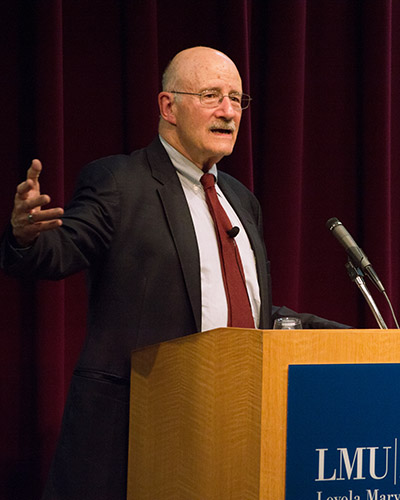America’s New Normal? Populist Nationalism and Polarization in the United States
Tuesday, October 13, 2020
In the fourth Live from Washington event aimed especially at interested viewers in China, USCET partnered with its good friends at AmCham – the American Chamber of Commerce in China – for a ninety-minute program on populist nationalism and polarization in the 2020 Election. Over 75 participants representing academia, business, and government tuned in for a lively discussion from 11 countries and territories. USCET Special Advisor Robert Kapp, former president of the US-China Business Council, moderated the forum. Key invited speakers were Thomas Carothers, Senior Vice President for Studies at The Carnegie Endowment for International Peace; Evan Feigenbaum, Vice President for Studies at the same distinguished think tank and former senior State Department official, and William Zarit, Senior Counselor at The Cohen Group in Washington, D.C. and formerly Minister of Embassy for Commercial Affairs at the US Embassy in Beijing.
Each of the presenters opened with solo comments. Then the three speakers engaged in a back-and-forth discussion of key points presented in the starting phase of the webinar. The final phase of the event was a live question-and-answer exchange among members of the viewing audience and the distinguished presenters.
The entire webinar kept in mind that its audience was primarily in China, including substantial numbers of Chinese citizens both from academic life and from the commercial sector, including representatives of AmCham member companies operating in the PRC.
Thomas Carothers
Thomas Carothers’ opening observations drew on his authoritative research into the twin phenomena of polarization and nationalism in American politics. Polarization, he noted, implied that society was divided into two irreconcilable and opposing communities, each regarding the other not as a competitor or adversary but as an enemy, with whom nothing was shared. Entrenched polarization turned the ordinary contentiousness of politics into a merciless clash of conflicting identities. The American Civil War, the bitter political divisions of the Depression-New Deal era, and the more recent evolution of the two-party system into a conflict of opposing camps, each monopolizing the loyalties of an identity-based constituency, all representing the tendency toward polarization in American politics over the course of time. The most recent, and present example of political polarization has reflected especially the role of mass media and, in particular the role of social media, in deepening the isolation of one American identity-group from the other. Furthermore, whereas traditionally the American president played a unifying and consolidating role in an American society never free of tendencies to fragmentation, Carothers observed, the current U.S. president has based his own political strategy on exacerbating those tendencies.
Carothers maintained, nonetheless, that the United States still maintains an overarching concept of an American national identity, which is likely to hold the country together even in the face of the current very severe test of American national cohesion.
Nationalism, to Carothers, is generally a necessary part of any nation’s existence, since it represents a popular sense of the value of the nation, perhaps the specialness or uniqueness of the nation in positive senses. Nationalism becomes dangerous, however, when it gives rise to xenophobic or aggressively hostile approaches to external targets. Such nationalism generally arises from deep and urgent feelings of insecurity among a nation’s populace. In the present American instance, the roots of that insecurity seem to lie in changing social and economic trends, including increasing levels of immigration and growing instability in certain employment sectors over the past several decades. Under such circumstances, manipulation of such insecurities by political opportunists can create the kind of extreme, or aggressive, nationalism now observable in American political life. This insecurity has become intertwined with growing uneasiness about the American position in the world, as other countries, including China, have emerged with hitherto unrecognized power and influence on the global stage.
Carothers closed by observing that the nationalism now increasingly visible in American politics is not likely to vanish in coming years, no matter which candidate wins the 2020 election. In Carothers’s words, “We are in for a hard ride.”
Evan Feigenbaum
Evan Feigenbaum, a China scholar by training and a senior State Department official for nearly a decade, offered a stimulating analysis of current and future trends with respect to nationalism, both American and Chinese. Both the US and China, he noted, evince a powerful nationalism based on a common threat. In the US, moreover, with respect to China in particular, nationalist sentiments transcend party lines: intense concern with the challenges China poses to the United States are shared by “strange political bedfellows” from both parties, especially in the US Congress.
Feigenbaum’s analysis of the long-term influence of nationalism on the US-China relationship emphasized three distinctive dimensions of nationalism, which he labeled Security Nationalism, Techno-Nationalism, and Extraterritorial Nationalism.
In the Security Nationalism environment, the familiar competition associated with American business practices and norms (in which competition does not equate to extermination of the competitor) has in recent years been overcome by a zero-sum definition of competition, under which virtually all aspects of commercial engagement with China have come to be viewed through a filtering lens of primary concern with American national security. That is, the longstanding assumption that commercial engagement between the US and China would play a moderating role in preventing ever-present security concerns from running away with the entire bilateral relationship has been reversed, as deepening worry over military and security issues has imposed itself on all elements of Sino-American commercial exchange – of goods, of people, of technology, of capital, and of data. A key example of this shift in US thinking could, according to Feigenbaum, be found in Vice President Mike Pence’s recent presentations on the dangers of China’s “civilian-military fusion” policies, which, in the view of the current US Administration, erase the boundary between commercial and defense technology and thus call for the attenuation of trade and co-innovation partnerships with China on the full range of technology goods and services..
Techno-nationalism, according to Feigenbaum, starts with the presumption that technology, particularly in a set of key fields deemed foundational for future economic and military power, must emanate from a country’s very own resources, and be protected from infection, or theft, by others. This growing concern, in both the US and China, leads toward the disaggregation of complex multi-national supply Chains, a trend now visible in American policy and commercial practice. But the globalization of technological innovation, exemplified by the establishment of R&D Centers in China by leading American technology companies, means that techno-nationalist “decoupling” will be difficult to execute without severe pain. The overarching reality, according to Feigenbaum, is a shift in the dynamic between commercial and military innovation. Whereas, in the decades immediately following WW II, many of the transformative technologies originated in military innovations such as radar and computing, by the 1970s it was innovations in the non-governmental, or commercial sector such as semiconductors and other commercial microelectronics that increasingly gave rise to transformations in US military technologies. Now, Feigenbaum argued, the emphasis is on the dual- or multi-use nature of emerging and foundational technologies, as key forward-looking innovation sectors, such as AI, are critical for national security and defense in addition to their commercial and public benefits. That, in turn, is already leading to highly visible controversies in the U.S., including the rapidly heating debate over the training of Chinese students and researchers in STEM fields at American universities, as well as US government efforts to compel American firms to isolate their supply chains and their export strategies from contamination by Chinese companies. China’s indigenous innovation and “Made in China” policies also have deep techno-nationalist roots.
Feigenbaum’s final observation on the current manifestation of nationalism in both American and Chinese policy-making was that both countries are now attempting to impose extraterritorial measures on third countries. Elements of the new Hong Kong National Security Law enacted by China, for example, seem intended to compel people in third countries to obey a law promulgated in Beijing for the ostensible purpose of enhancing “national security” in the administration of Hong Kong. The United States continues to promulgate measures designed to compel third-country actors to behave as the United States export-control dictates with regard to China, in a manner similar to earlier U.S. extraterritorial mandates related to third country relations with Iran.
Feigenbaum’s sober conclusion to all of these points was that nationalism, in the manners he described, are likely to continue to shape Sino-American relations in coming years, regardless of whether the US Administration is led by Donald Trump or Joseph Biden.
William Zarit
William Zarit’s presentation focused on commercial relations between the US and China, relations which have, since the beginning of China’s Reform and Opening in 1978, grown to represent the largest bilateral commercial ties on the globe.
Because Zarit had previously served as Chairman of the American Chamber of Commerce in China and continues, from his D.C. post, to serve as the Vice Chair of AmCham, his remarks opened with a pointed observation: whereas AmCham had, over several decades, on occasion sought very carefully to offer constructive criticism of Chinese government policies, on behalf of the Chamber’s broad business constituency, with the realization that individual companies faced uncertain possibilities of Chinese government retribution if they too bluntly or boldly voiced their own criticisms of PRC government policies and practices, it has only been in the past four years that the Chamber has had to worry that it might face comparable retribution from the American government itself if it spoke out critically on American policies. Nowadays, Zarit noted, the US Administration at times accuses American business of aiding and abetting the Chinese Communist Party. Thus American companies today must tread a very fine line with respect to their engagements with government policies in both the US and China, and companies working in China must adopt a different, much lower key, approach to the development of their activities inside the PRC, for fear of becoming ensnared in Administration and media political criticisms.
Of the three speakers, however, it was Zarit, speaking from the perspective of American business, who most firmly emphasized that the current clash of nationalisms had deep roots not only in the United States but in China as well. The “tipping point,” he argued, came in 2017, as the United States began to respond more robustly to the accumulation of what he called “China’s mercantilist practices.” As he put it, it is possible to tolerate a small country that does not abide by international rules, or a big country that does abide by them, but it is not possible to tolerate a big country that does not abide by international rules, and that, in the perception of American companies, is what China has by now become.
Speaking from his own rich experience, Zarit observed that the numerous Sino-American government-to-government fora for the discussion of both practical and structural problems, starting with the Joint Commission on Commerce and Trade (1983) and continuing through such major consultations as the Strategic and Economic Dialogue initiated in the Bush and Obama presidencies, had not achieved the Americans’ intended goal of systematically “leveling the playing field” for American companies trading with, investing in, selling into, or (critically) seeking to establish their presence in the vast and growing Chinese market. Some new “grand bargain,” Zarit said, was needed, in which that more “level playing field” would be established.
But the American approach to China over the past four years, Zarit said, had failed to pursue, let alone reach, such a “grand bargain,” and had largely proved counterproductive. The Administration’s resort to extensive tariffs, and China’s retaliatory imposition of import tariffs, had proved costly to American business and to the American economy without achieving any of those market-opening goals for which the tariffs had ostensibly been imposed. Zarit spoke critically of the current American attempt to lay blame on China for many of America’s own, domestically-generated, problems. In the end, he concluded, policy decisions in the US come from the top, and those decisions as related to economic and commercial relations with China, had not been good for American business.
Discussion
In the discussion among the three presenters that followed, several points arose that deserve mention.
- China regularly comes up in US national political campaigns, but it is not ordinarily a “dispositive” issue; it has not been, and still is not, a top issue among voting Americans. The difference in the 2020 election arises from the Covid pandemic, which first appeared in China and which the current US president has loudly and stridently accused China of inflicting on the American people. But the political implications of the Covid disaster have not crystallized, and certainly have not provided a decisive political advantage for the current President.
- American differences of opinion on China are less divided between Republicans and Democrats than between Washington, D.C. on the one hand and states and localities around the nation on the other. Below the national level of policy making, state governors, urban mayors and many civic groups remain interested in developing mutually beneficial opportunities for commercial and other engagements with the PRC. Farmers, ranchers and others see themselves as stakeholders in bilateral relations but are concentrated in states and voting blocs that tend to support the current President for reasons unrelated to China.
- China is “not doing itself any favors” with international behavior, which seems to suggest an unhealthy degree of over-confidence on the part of its leaders. “Wolf Warrior” diplomacy, for example, and efforts to compel other countries’ behavior on threat of imposition of China’s superior economic power have led to a widespread deterioration in other countries’ perceptions of the PRC, as evidenced in recent PEW polling.
- “Nationalism” and hyper-nationalism historically have had an element of nostalgia that appealed to public imaginations: Mussolini’s evocation of the glories of ancient Rome, is but one example. Today, Trump’s appeal to “Make America Great Again,” and China’s emphasis on the “Rejuvenation” of the Chinese people, seem to embody similar appeals for the resurrection of lost greatness. This element of nationalism is frequently found as well in nations that have lost some of their former powers, e.g. the European former colonial powers. Trump has added to that the claim that he is “standing up” to other foreign adversaries in ways that his predecessor had failed to do.
- In response to a query about “best and worst case prospects” for US-China relations over the coming five years, Feigenbaum coined the term “Managed Enmity,” by which he meant an environment of unrestricted competition but of lessened confrontation and with some national security guardrails. In his view, US policy in recent years has been characterized by plenty of confrontations but not by enhanced competition, principally because the United States has not proved capable of organizing itself to meet the incontrovertible competitive challenges posed by the PRC. The optimal outcome, in his view, would be a) “putting a floor under the present free fall” in bilateral relations (by placing “boundaries” around the security policy issues, so that the entire array of Sino-American engagements could avoid the present tendency to force anything and everything through the filter of military-national security priorities; and, importantly, a renewed effort to identify those vital transnational areas in which Sino-American cooperation has proven effective in the past and/or will prove crucial in the future.
- Should the United States and China not rein in current tendencies, the rest of the world is more likely to strike out on its own paths than it is to “take sides” with either the United States or China. Instead of “bifurcation” of the world into two opposing global “camps” reminiscent of the US-USSR Cold War era, global “fragmentation” and shifting issue-specific coalitions will more likely result, raising serious problems of global stability and international progress. For example, on the matter of conflicting ambitions in the realm of establishing global technical standards, an issue that the United States increasingly views as fundamental to the nation’s economic and military strength, the assumption that the world will divide into a “U.S. standards zone” and a “PRC standards zone” may well be erroneous since many countries, such as India, will aim to set standards themselves.
- In the next five years, in the view of one of the presenters, any industry involved with advanced technologies will be “in the political cross hairs,” not only in the U.S. but in China as well. (Another metaphor for that might be “under the political microscope.”) American measures already coming into effect are not going to go away. It is possible, however, that if the next US Administration is led by Joseph Biden, those charged with making and carrying out Administration policies in this arena will prove to be more systematic, more attuned to stable institutional arrangements, and more appreciative of the potentialities for multilateral cooperation, including as a source of pressure on Beijing, than has been true of the figures staffing the present Administration under the current President, whose approach to the major issues dealt with in this webinar was characterized by one of the speakers as “haphazard.”
This Live From Washington webinar, presented by the US-China Education Trust in cooperation with the American Chamber of Commerce in China, offered thoughtful and well-informed perspectives on the much-discussed trends toward “nationalism, populism, and polarization” in contemporary American politics, against the background of the 2020 American election campaign now in its final phase. USCET hopes that its friends in China have found this webinar, and its predecessors in the Live From Washington Series, helpful as they watch, from a trans-Pacific distance, the noisy and sometimes chaotic electoral drama leading to the November 3 election day. The opinions expressed in the webinar are solely those of the distinguished speakers and are not the official opinions either of the speakers’ affiliated institutions, or of the US-China Education Trust, or of the American Chamber of Commerce in China.
Speakers

Thomas Carothers
Vice President, Carnegie Endowment for International Peace
Thomas Carothers is senior vice president for studies at the Carnegie Endowment for International Peace. In that capacity he oversees all of the research programs at Carnegie. He also directs the Democracy, Conflict, and Governance Program and carries out research and writing on democracy-related issues. Carothers is a leading authority on international support for democracy, human rights, governance, the rule of law, and civil society. He is the author or editor of ten critically acclaimed books and many articles in prominent journals and newspapers, including most recently, Democracies Divided: The Global Challenge of Political Polarization (Brookings Press, 2019, co-edited with Andrew O’Donohue).
Link to Full Biography Here

Evan Feigenbaum
Vice President, Carnegie Endowment for International Peace
Evan A. Feigenbaum is vice president for studies at the Carnegie Endowment for International Peace, where he oversees research in Washington, Beijing and New Delhi on a dynamic region encompassing both East Asia and South Asia. He is also the 2019-20 James R. Schlesinger Distinguished Professor at the Miller Center of Public Affairs at the University of Virginia. From 2001 to 2009, he served at the U.S. State Department as deputy assistant secretary of state for South Asia (2007–2009), deputy assistant secretary of state for Central Asia (2006–2007), member of the policy planning staff with principal responsibility for East Asia and the Pacific (2001–2006), and an adviser on China to Deputy Secretary of State Robert B. Zoellick, with whom he worked closely in the development of the U.S.-China senior dialogue.
Link to Full Biography Here

William Zarit
Senior Counselor, The Cohen Group
The Honorable William Zarit advises major Chinese companies on how to navigate the US investment market and helps US multinationals working in the Chinese commercial environment. He also serves as Chairman of the Board for the American Chamber of Commerce in China. Until May 2014, Mr. Zarit was Minister for Commercial Affairs at the US Embassy in Beijing, overseeing the US Department of Commerce’s trade promotion and trade policy activities in its operations in Beijing, Chengdu, Guangzhou, Shanghai, and Shenyang. He retired with the rank of Career Minister. Prior to his posting to Beijing, Mr. Zarit was Deputy Assistant Secretary, International Operations, for the US Commercial Service, overseeing Commercial Sections in US Embassies and Consulates worldwide.
Link to Full Biography Here
Moderator

Robert Kapp
President, Robert A. Kapp & Associates
Dr. Robert A. Kapp is president of Robert A. Kapp & Associates, and former President of The US-China Business Council. His firm provides consulting services to companies and nonprofit organizations seeking to develop successful activities with China or to engage with policy makers in the field of U.S.-China relations. Dr. Kapp is Special Advisor, Planning and Publication, for the US-China Education Trust. From April 1994 to November 2004, Dr. Kapp served as president of The US-China Business Council, the principal organization of American companies engaged in trade and investment with China. In addition to guiding the business services, publications, and program activities of the US-China Business Council from its offices in Washington, Beijing and Shanghai, Dr. Kapp regularly represented the American business community engaged with China, in both Washington and Beijing.
Link to Full Biography Here

